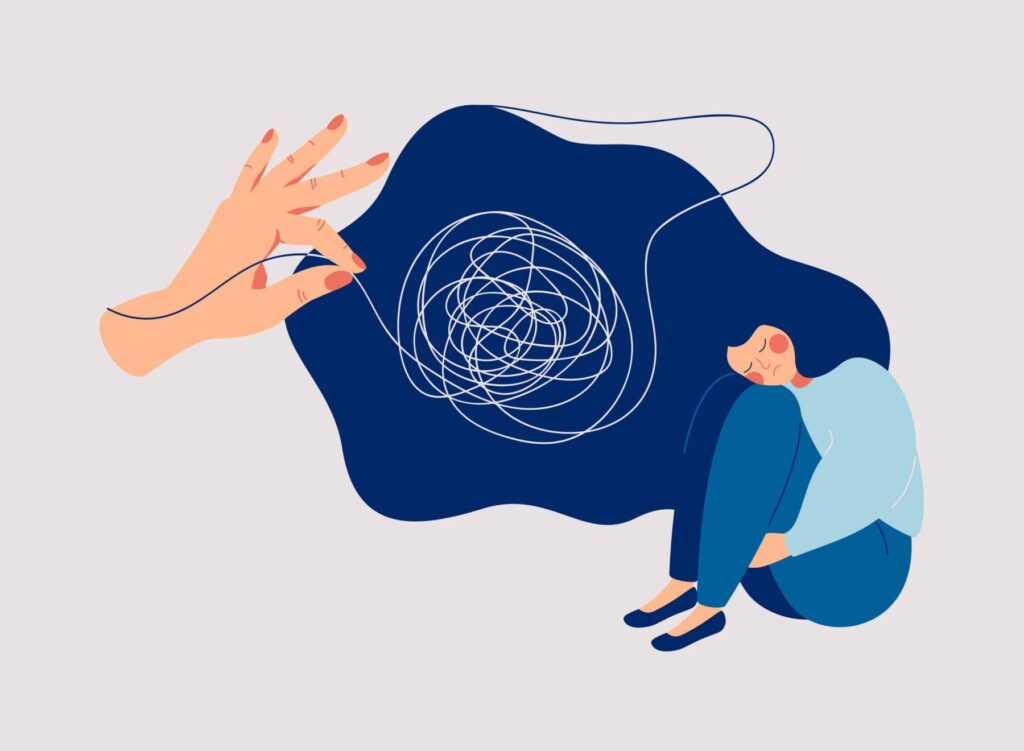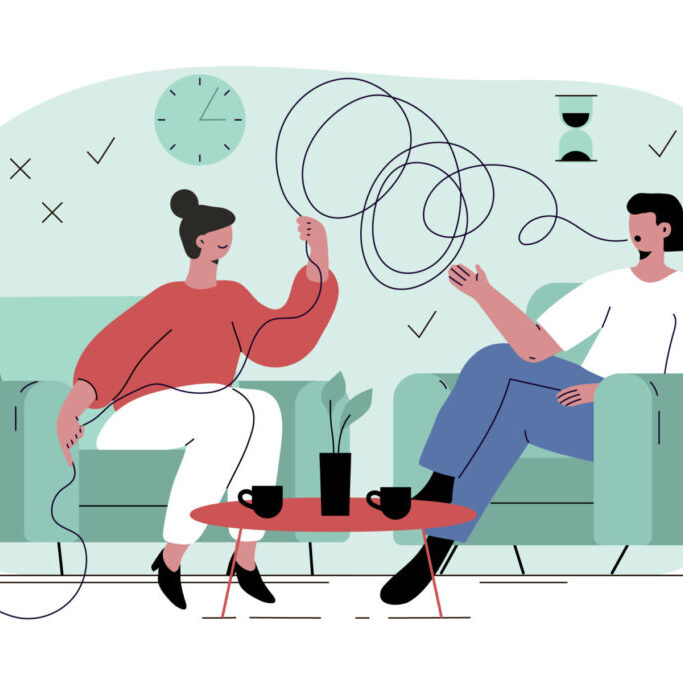Navigating Depression in the LGBTQ+ Community: How Therapy Creates a Judgment-Free Zone

Let’s talk about depression—it’s not just a case of the Mondays or a sad rainy afternoon. No, we’re talking about depression that sticks around like a bad roommate, stealing your joy and leaving you with the existential equivalent of unpaid rent.
For LGBTQ+ folx, it’s not just the depression—it’s the societal baggage, the stigma, and the systemic nonsense piled on top. So, the question is: can LGBTQ+ therapy help? And the answer is, oh my, can it ever.
The Heavy Toll of Depression in the LGBTQ+ Community
First, let’s get the stats out of the way. According to Meyer’s minority stress model (2003)—yes, there’s a model for this—chronic stigma and discrimination create a hostile environment that’s basically a breeding ground for LGBTQ+ depression. LGBTQ+ people are up to 2.5 times more likely to experience depression (National Institute of Mental Health). And LGBTQ+ youth? They’re really feeling it and at even higher risk, with 42% seriously considering suicide last year (Trevor Project, 2021).
Now throw in a political climate that’s often directly attacking queer people. Anti-LGBTQ+ executive actions and legislation are the cherry on this depressing sundae, with Green et al. (2022) confirming that hostile policies lead to higher anxiety and depression rates.
It can feel as though the challenges faced by LGBTQ+ people are compounded at every turn, creating additional layers of hardship that make navigating life even more difficult. Thankfully, LGBTQ+ therapy can be the safe harbor where folks can unpack this mess and start healing.
Stigma and Intersectionality: A Double-Edged Sword
What’s Intersectionality? (Hint: It’s Not a Buzzword)
Intersectionality, coined by Kimberlé Crenshaw, is like the Venn diagram of oppression. For example, a Latina lesbian doesn’t just face homophobia; she’s also navigating racism and cultural biases. It’s like carrying a backpack full of bricks while everyone else has a carry-on.
How It Shows Up in Chicago
Take Chicago’s Boystown—a so-called “safe haven” for LGBTQ+ people. Except, if you’re Black, Brown, or not a cis gay man, you might feel like you got an invite to the party but can’t get past the velvet rope. According to the Center for American Progress (2020), 61% of Black LGBTQ+ people report facing discrimination even within LGBTQ+ spaces. Thankfully, groups like Brave Space Alliance are working to make inclusivity more than just a buzzword in Chicago’s LGBTQ and depression landscape.
Therapy: A Judgment-Free Zone
Why LGBTQ+-Affirming Therapy Is a Game-Changer
Here’s the deal: therapy that’s tailored to LGBTQ+ people isn’t just nice to have—it’s essential. Research by Pachankis et al. (2015) shows that affirming therapy—the kind that celebrates your identity instead of questioning it—leads to better mental health outcomes. It’s like switching from regular coffee to espresso: same idea, but way more effective. For those struggling with LGBTQ+ depression, a therapist who affirms your identity can make all the difference.
What Happens in Therapy?
In LGBTQ+ therapy, you’re not just another number or a case file. You’re a person with unique experiences, challenges, and strengths. Sessions are designed to feel like a space where you can finally exhale. A therapist might ask questions that help you pinpoint the sources of negative self-talk or guide you through exercises to explore how past experiences shape your present feelings.
They might work with you to rewrite the narratives that have been keeping you stuck or help you visualize and practice setting boundaries in difficult relationships. If you’ve been through trauma, your therapist may gently help you process those experiences at your own pace, using grounding techniques or guided visualizations to make the process feel safe. Above all, LGBTQ+ therapy is a space where your identity is celebrated, your experiences are validated, and your path toward healing is uniquely yours.
How Therapy Tackles Depression Head-On
So, why is depression therapy so effective for LGBTQ+ depression?
- Breaking Isolation – Depression thrives on loneliness, and LGBTQ+ therapy provides a space where people who are depressed can feel seen and heard, counteracting that isolation.
- Challenging Stigma – Affirming therapists help clients unpack and challenge internalized negativity that society often imposes on LGBTQ+ identities. Stigma that impacts our core beliefs about ourselves and shapes the way we perceive the world.
- Processing Trauma – Therapists assist in gently exploring and making sense of past traumatic experiences, such as family rejection or workplace discrimination, all of which increase the likelihood you will be depressed.
- Building Emotional Awareness – Depression therapy encourages clients to identify and name their emotions, fostering greater self-understanding and emotional regulation. These skills are particularly important for LGBTQ+ people who may have subconsciously learned to protect themselves by ignoring their own feelings.
- Enhancing Self-Compassion – Therapy fosters kindness toward oneself, replacing cycles of self-criticism with understanding and care. That internal critic isn’t likely to motivate you to get to work or to call your friend when you feel down.
- Addressing Intersectionality – For LGBTQ+ people with intersecting marginalized identities, LGBTQ+ therapy examines how these dynamics interact and impact beliefs about yourself, your future, and the future of the world.
- Creating Long-Term Growth – Depression therapy doesn’t just address current struggles—it builds skills and perspectives that support ongoing mental wellness and self-acceptance which helps to prevent future bouts with LGBTQ+ depression.
- Encouraging Accountability and Homework – Depression therapists provide structured follow-ups and specific exercises to work on between sessions, reinforcing the work done in therapy and fostering self-reliance.
- Highlighting Blind Spots – A skilled depression therapist helps clients uncover areas where they may lack awareness—such as deeply ingrained patterns or assumptions—and gently challenges them to see things from a new perspective.
- Empowering Advocacy – LGBTQ+ therapists often guide clients to become advocates for themselves, whether in workplace situations, healthcare settings, or social spaces, giving them the tools to stand up for their needs and rights.
Affirming depression therapy is effective because it meets LGBTQ+ people where they are, providing a supportive and challenging partnership to navigate the complexities of identity, LGBTQ+ depression, and resilience.
Consider Alex’s Story
Alex, a nonbinary adult, entered therapy carrying years of emotional weight stemming from family rejection, workplace discrimination, and the pervasive effects of minority stress.
Despite moving toward building a life that aligned with their authentic self, Alex continued to struggle with LGBTQ+ depression and feelings of worthlessness, often questioning their value in a society that seemed to reject them at every turn.
Minority stress manifested in Alex’s life as constant hypervigilance, fearing judgment in both professional and social settings, and the internalized belief that they needed to overachieve just to feel deserving of basic respect.
In therapy, Alex’s therapist used Cognitive Behavioral Therapy (CBT) to help them identify and challenge the automatic negative thoughts that reinforced their low self-worth. Affirmative LGBTQ+ therapy also played a pivotal role, as it provided Alex with a space where their identity was celebrated rather than scrutinized.
This therapeutic relationship allowed Alex to process the trauma of past rejections and explore strategies to cope with the ongoing pressures of navigating life as a nonbinary person in an often hostile environment.
Although their journey is ongoing, Alex has found solace in community support networks and learned to set boundaries that protect their mental health. Depression therapy has empowered Alex to recognize their intrinsic value and take steps toward living a life grounded in self-acceptance and resilience.
Depression Impacting LGBTQ+ People in Chicago
Chicago’s queer community is vibrant, but it’s not all rainbows and parades. Racism, classism, and rising rents in neighborhoods like Lakeview and Andersonville mean that many queer people feel excluded from spaces designed to be inclusive. Groups like Tandem Psychology are working to fix that, but it’s a reminder that even in “safe” spaces, there’s still work to be done.
Let’s Tackle Depression Together—We’ve Got This
Depression doesn’t discriminate, but therapy can—in all the best ways. If you or someone you know is struggling, don’t wait. Reach out to an LGBTQ+ affirming therapist and take that first step toward reclaiming your mental health. At Tandem Psychology, we specialize in creating safe, affirming spaces because everyone deserves to thrive. You’re queer; we’re queer and here; we can handle this!
This blog is made for informational and educational purposes only. It is not medical advice. The information in this blog is not intended to (1) replace a one-on-one relationship with a qualified licensed health care provider, (2) create or establish a provider-patient relationship, or (3) create a duty for us to follow up with you.



